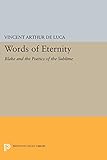Words of Eternity : Blake and the Poetics of the Sublime / Vincent Arthur De Luca.
Material type: TextSeries: Princeton Legacy Library ; 1164Publisher: Princeton, NJ : Princeton University Press, [2014]Copyright date: ©1991Edition: Course BookDescription: 1 online resource (256 p.)Content type:
TextSeries: Princeton Legacy Library ; 1164Publisher: Princeton, NJ : Princeton University Press, [2014]Copyright date: ©1991Edition: Course BookDescription: 1 online resource (256 p.)Content type: - 9780691606880
- 9781400861781
- 821/.7
- PR4148.S92 -- D45 1991eb
- online - DeGruyter
- Issued also in print.
| Item type | Current library | Call number | URL | Status | Notes | Barcode | |
|---|---|---|---|---|---|---|---|
 eBook
eBook
|
Biblioteca "Angelicum" Pont. Univ. S.Tommaso d'Aquino Nuvola online | online - DeGruyter (Browse shelf(Opens below)) | Online access | Not for loan (Accesso limitato) | Accesso per gli utenti autorizzati / Access for authorized users | (dgr)9781400861781 |
Frontmatter -- CONTENTS -- ILLUSTRATIONS -- ACKNOWLEDGMENTS -- TEXTS AND ABBREVIATIONS -- INTRODUCTION -- PART ONE: THEORY -- CHAPTER ONE. Blake's Concept of the Sublime -- PART TWO: STYLE: SUBLIME EFFECTS -- CHAPTER TWO. The Bardic Style: Sublime Extension -- CHAPTER THREE. The Iconic Style: Sublime Concentration -- CHAPTER FOUR. Narrative Sequences: Modes of Organization -- PART THREE: WORLDVIEW: IMAGERY OF SUBLIME SETTINGS -- CHAPTER FIVE. The Setting of Nature and the Ruins of Time -- CHAPTER SIX. The Setting of the Divided Nations: The Antiquarian Sublime -- CHAPTER SEVEN. The Settings of Signs: Language and the Recovery of Origins -- EPILOGUE. Blake's Sublime in the Romantic Context -- INDEX
restricted access online access with authorization star
http://purl.org/coar/access_right/c_16ec
William Blake called himself a "sublime Artist" and acknowledged his own power to create "the Most Sublime Poetry." Words of Eternity reveals the fundamental importance of the term "sublime" in a defining of Blake's poetic achievement. This first full-length study of Blake and the sublime demonstrates that a sophisticated theory of sublimity permeates his writings, serving him as a personal poetics, a framework in which the difficulties and unusual strategies of the works find their rationale. Vincent De Luca combines historically grounded source study with insights from modern critical theories of textuality to identify Blake's two opposing conceptions of sublimity--a sublime of obscurity, terror, and material power and one of determinate, concentrated intellectual design. De Luca examines the interplay between these two modes from differing perspectives--theoretical, stylistic, and thematic. As the perspectives widen, they embrace many of the speculative systems of Blake's time and reveal these systems as various displaced modalities of an underlying sublime discourse. "Words of Eternity is one of the dozen or so most important books ever written about Blake's poetry. De Luca provides a wealth of new insights on every page."--Robert N. Essick, University of California, Riverside "With the context that this book supplies, we take a quantum leap in the sense we can make of Blake's project. De Luca opens our eyes to a Blake, and a sublime, that will never again be the same for us."--Nelson Hilton, University of GeorgiaOriginally published in 1991.The Princeton Legacy Library uses the latest print-on-demand technology to again make available previously out-of-print books from the distinguished backlist of Princeton University Press. These editions preserve the original texts of these important books while presenting them in durable paperback and hardcover editions. The goal of the Princeton Legacy Library is to vastly increase access to the rich scholarly heritage found in the thousands of books published by Princeton University Press since its founding in 1905.
Issued also in print.
Mode of access: Internet via World Wide Web.
In English.
Description based on online resource; title from PDF title page (publisher's Web site, viewed 30. Aug 2021)


